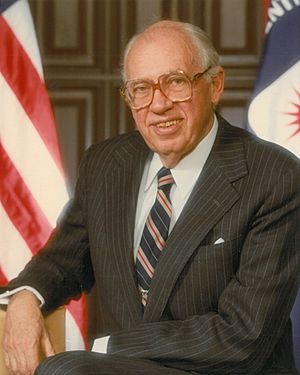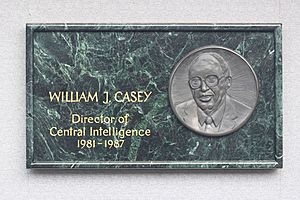William J. Casey facts for kids
Quick facts for kids
William J. Casey
|
|
|---|---|
 |
|
| 13th Director of Central Intelligence | |
| In office January 28, 1981 – January 29, 1987 |
|
| President | Ronald Reagan |
| Deputy | Frank Carlucci Bobby Ray Inman John N. McMahon Robert Gates |
| Preceded by | Stansfield Turner |
| Succeeded by | William H. Webster |
| Chairman and President of the Export–Import Bank of the United States | |
| In office March 14, 1974 – January 2, 1976 |
|
| President | Richard Nixon Gerald Ford |
| Preceded by | Henry Kearns |
| Succeeded by | Stephen M. DuBrul Jr. |
| Under Secretary of State for Economic Affairs | |
| In office February 2, 1973 – March 14, 1974 |
|
| President | Richard Nixon |
| Preceded by | Thomas C. Mann |
| Succeeded by | Charles W. Robinson |
| Chair of the Securities and Exchange Commission | |
| In office April 14, 1971 – February 2, 1973 |
|
| President | Richard Nixon |
| Preceded by | Hamer H. Budge |
| Succeeded by | G. Bradford Cook |
| Personal details | |
| Born |
William Joseph Casey
March 13, 1913 New York City, New York, U.S. |
| Died | May 6, 1987 (aged 74) Roslyn Harbor, New York, U.S. |
| Political party | Republican |
| Spouse | Sophia Kurz |
| Children | 1 daughter |
| Education | Fordham University (BS) St. John's University (LLB) |
| Military career | |
| Allegiance | |
| Service/ |
|
| Years of service | 1943–1946 |
| Rank | Lieutenant |
| Unit | United States Naval Reserve, Office of Strategic Services |
| Battles/wars | World War II |
| Awards | Bronze Star Medal |
William Joseph Casey (March 13, 1913 – May 6, 1987) was a very important person in the United States government. He is best known for being the Director of Central Intelligence (DCI) from 1981 to 1987. In this job, he was in charge of all the spy agencies in the U.S. and directly led the Central Intelligence Agency (CIA).
Contents
Early Life and Education
William Casey grew up in Queens, New York. He was a Roman Catholic. He went to Fordham University and graduated in 1934. Later, he studied law at St. John's University School of Law and became a lawyer in 1937.
Career Highlights
Starting His Career
After becoming a lawyer, Casey worked at a law firm in New York. He also helped create a company called the Research Institute of America. This company helped business people understand new government rules.
World War II and Spy Work
During World War II, Casey joined the Office of Strategic Services (OSS). The OSS was America's main spy agency at the time. He became the head of the Secret Intelligence Branch in Europe. He was a lieutenant in the United States Navy Reserve. For his good work, he received the Bronze Star Medal.
After the War
After the war, Casey went back to his legal and business work. He also worked for the U.S. Senate. In 1950, he started the Institute for Business Planning. This helped him earn a lot of money. He also taught tax law at New York University School of Law.
Working for Presidents Nixon and Ford
Casey held several important jobs in the government under Presidents Richard Nixon and Gerald Ford.
- He was the chairman of the U.S. Securities and Exchange Commission (SEC) from 1971 to 1973. The SEC helps make sure stock markets are fair.
- He then worked as the Under Secretary of State for Economic Affairs from 1973 to 1974. This role involved dealing with economic matters for the U.S. around the world.
- From 1974 to 1976, he was the chairman of the Export–Import Bank of the United States. This bank helps American companies sell their products to other countries.
Helping Ronald Reagan
William Casey was the manager for Ronald Reagan's presidential campaign in 1980. Reagan won the election, and Casey played a big part in his success.
Director of Central Intelligence
When Ronald Reagan became president, he chose William Casey to be the Director of Central Intelligence (DCI). This was a very powerful job. Casey was in charge of the entire United States Intelligence Community, including the Central Intelligence Agency (CIA).
President Reagan made the DCI role a part of his Cabinet. This meant Casey had a direct say in foreign policy. Casey worked to make the U.S. intelligence agencies stronger. He increased their funding and the number of people working for them. This happened during the Cold War, when the U.S. was in a big competition with the Soviet Union.
Casey also secretly met with Pope John Paul II in Rome. These meetings were to share information about the Cold War.
Iran-Contra Affair

William Casey was involved in a controversial event called the Iran–Contra affair. In this situation, some people in the Reagan administration secretly sold weapons to Iran. They then used some of the money from these sales to help a rebel group called the Contras in Nicaragua. This was against U.S. law.
Casey became sick and was hospitalized shortly before he was supposed to testify about the affair. He had a brain tumor. He died in May 1987.
A reporter named Bob Woodward wrote a book about Casey. Woodward claimed that Casey nodded "yes" when asked if he knew about the money going to the Contras. However, official investigations did not find clear proof that Casey knew about or approved the illegal money transfer.
Personal Life
Casey was a member of the Sovereign Military Order of Malta, a Catholic order. He lived in a large home called Mayknoll in Roslyn Harbor, New York. He was married to Sophia Kurz and had one daughter, Bernadette Casey Smith.
Death
William Casey passed away on May 6, 1987, at the age of 74, due to a brain tumor. His funeral was attended by President Reagan and the First Lady. He is buried in the Cemetery of the Holy Rood in Westbury, New York.
See also
 In Spanish: William Casey para niños
In Spanish: William Casey para niños
- George Doundoulakis
- Helias Doundoulakis
- Killing Reagan (film)
- List of notable brain tumor patients

